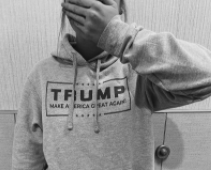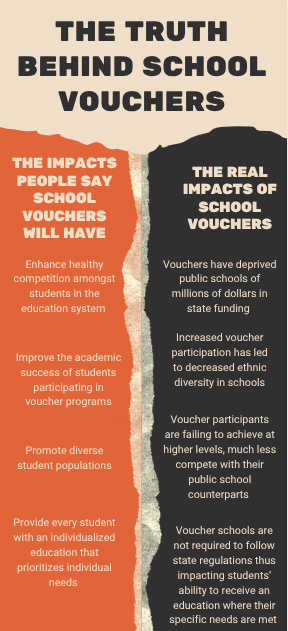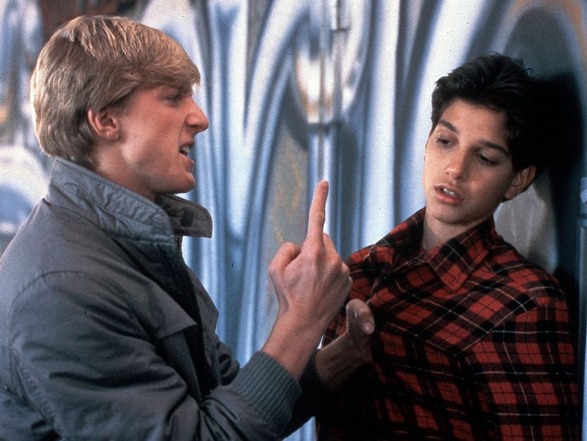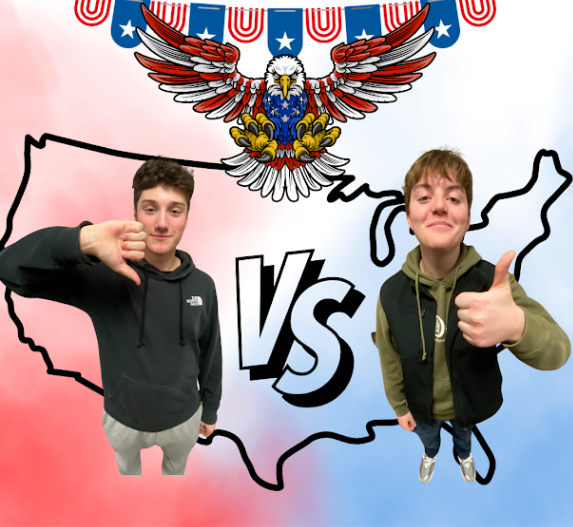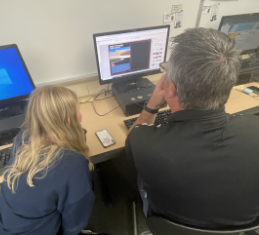Students have enough on their shoulders already. They should not be forced to deal with political divide and discrimination from peers and teachers at school. West Ottawa High School (WOHS) students are sick of the hostile political environment they face and want a change.
With the election coming up, politics are the topic of many conversations. Consequently, politics are also making their way into schools and friend groups.
Recently, many Democrat families have acquired yard signs that say: “In this house, we believe: black lives matter, women’s rights are human rights, no human is illegal, science is real, love is love, and kindness is everything.”
The current message in society is pushing tolerance, equality, and most importantly “kindness.” Unfortunately, this mindset is falling short at WOHS.
Conservative students’ experiences at school differ largely from Liberal students. Conservative students endure teachers trying to persuade them towards Liberal viewpoints, classmates discriminating against them for what they believe in, and an overall lack of kindness. Due to these circumstances, Conservative students are afraid to share or speak out about their beliefs.
The most common political discrimination students feel is from classmates in a classroom setting.
Jr. Callie Brondyke explained how her Conservative views cause peers and friends to treat her unkindly in the classroom. “I definitely know that most others around me are in disagreement with my political views, which makes it hard to speak out about my beliefs. Many of my friends make comments about Republicans being ‘racist’ or labeling Conservatives with other snarky words. Due to my friends’ intolerance of my views, I feel like if I spoke up, I would definitely lose many of my friendships. A lot of them also post things on social media about how they hate the other people on the right, and they would refuse to be friends with anyone who sided with President Trump. Honestly, I never speak out about my political beliefs in school because I know many of my friends will stop talking to me altogether.”
Soph. Charity Ihrman recalls a time in her classroom where she felt uncomfortable and peers have made judgments about her character. “In one of my classes, we were discussing the beliefs of different political parties and sharing opinions. I knew some people in that class were Democrats, and discussing politics with people who you know have opposing viewpoints can often be uncomfortable. Oftentimes, I feel like people can make untrue judgments about a person’s character and morality based simply on political parties; therefore, I wish that my viewpoints weren’t the first thing people knew about me. Also, I find that it can be difficult to effectively articulate your beliefs (especially in a classroom setting) without offending others since politics are a sensitive subject.”
A WO sophomore explained the judgment and name-calling he receives from peers when sharing his beliefs. “I try to stay away from politics mostly in school, but when I do, I feel like I either get attacked or judged by a lot of people. In class, if I say something about President Trump, I get called derogatory terms such as disgusting and a racist.”
Jr. Hannah Pearson gives a specific time in class she received hate from peers. “If I do speak up about my political beliefs, I feel very uncomfortable and have classmates give me bad looks. In fact, just recently in one of my classes, we were taking an online quiz that shows us where we fall on the political scale. My teacher then asked us what percentage Conservative or Liberal we were (I got 92% Conservative and 8% Liberal). I knew once my teacher asked me what my percentages were, students in that class would give me bad looks. Sure enough, after hearing where I fell on the scale, a girl that sits behind me said to a girl next to her ‘I hate her already.’”
A WO junior said, “I can remember a time when a few members of the Young Republicans club were timid to be involved in the club parade in last year’s assembly. They were fearful that people in the audience, both friends and teachers, would either change their opinions about them, see them differently, or shame them after they walked through the gymnasium holding our club’s banner.”
Jr. Ian Snoap explained the vehement reactions he received from others after wearing a Trump flag to school. “My friend had offered to let me borrow his Trump 2020 flag so I could express my political beliefs and my support for our president. I decided I would drape the flag over my back as a cape, because I knew it would show the flag off very nicely. I put the flag on halfway through school at lunch, and immediately, I started getting strong reactions. Since no one likes to be confrontational nowadays, many students from West Ottawa decided to bash me via social media.” Unfortunately, the multitude of hate on Snoap over social media was evident that day. Just by scrolling through Snapchat stories or Instagram, pictures that students had taken of Snoap were prominent with captions expressing their hate for him. Students explained how they don’t want Snoap at school anymore and were very unkind.
Lastly, a WO junior describes a time when she felt silenced by her peers. “In one of my classes, the people who I sit with during work time started up a conversation about politics. They went directly to bashing the Republican party, and they said things like Conservatives are ‘stupid people’ and they hated all of them because ‘if you support Trump and those views, you were extremely dumb and racist.’ I had no other choice but to sit there silently because I would have been attacked by every single person at that table. For what… who I support politically? The political atmosphere is just hostile and uncomfortable for people who do not politically align with them.”
Over the course of a school year, students spend a lot of time with their teachers. In times of uncertainty, students look up to teachers and are influenced by them more than ever. It’s important that teachers are educating students how to think and gather information to form their own conclusions, rather than telling them what they should believe. Unfortunately, students at WO have recently noticed that teachers are discussing and expressing political agendas more than ever in the classroom.
A WO junior describes a time when his political ideals caused them to get a poor grade. “My freshman year I wrote an argumentative essay about the immigration policy and why the US should have a tighter immigration policy. Since my teacher did not agree with my topic, my teacher was very unhelpful when advising me on how to connect my paper together. The teacher also told me that I was going to have to stretch the truth about my topic, even though I already had the evidence to back it up. In the end, I received a bad grade. After putting countless hours in and out of school into the paper and having multiple people proofread it, I thought the grade I received was crazy. A teacher’s political beliefs shouldn’t impact my grade.”
A WO junior explains a time his teacher was trying to impose their beliefs. “In my first hour, on Constitution Day, our class was talking about amendments to the Constitution. My teacher was saying how he believes it was time to have a new amendment added. That next amendment he believed should abolish the electoral college. I felt very uncomfortable in this situation. I didn’t want to argue with my teacher and many classmates about how the electoral college is in place to keep one party from winning every election. In that class, many of the students agreed with my teacher and I felt like I was the only one who did not. I felt very uncomfortable and wanted to voice my opinion, but I knew better than to argue my beliefs. I knew it would be futile to argue with someone that was set in their ways and wouldn’t consider changing their beliefs.”
Brondyke explains how one of her teachers has brought division into the classroom. “I think teachers are more vocal in the classroom, especially being so close to the election. I’ve noticed teachers taking up a lot of class time to share their political viewpoints. We already only go to each class every other day, and we don’t have time to waste on politics. Ever since my teacher has brought up his views about certain political topics, it has brought division into the classroom. Now students sit in groups of people who align with their political beliefs rather than all together like we used to. This is truly saddening and distracting because this shouldn’t be such an issue in the classroom.”
One junior has experienced times that teachers express political ideals on people through videos they make them watch. “I feel like last year I had a teacher that thought my political ideas were stupid. I eventually had to change out of that class because the teacher would get so upset and vocal about politics. It was distracting and unnecessary. The teacher would tell us how stupid President Trump is and how she misses Barack Obama. We were also forced to watch CNN news, which is a Democrat-leaning news media. CNN is also known to be very biased as well.”
The amount of students that requested to be anonymous is another example of how students are fearful to express their beliefs. Students are nervous that someone with an opposing viewpoint will read this article and see or treat them differently. The amount of worry and fear the Conservative students face is unacceptable and needs to end.
It’s ironic that the people who have yard signs pushing kindness are the ones being the most intolerant and unkind. It shouldn’t matter what race you are, what gender you identify as, what ethnicity you belong to, or what religion you practice, all people should be treated with kindness.
The clear political divide at WOHS is the driving factor in the lack of kindness. This lack of kindness and tolerance is a clear issue that needs to be addressed. It’s so important, more now than ever, that we don’t let political issues divide us, especially in schools.

